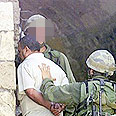
‘Human shield’ procedure banned
Procedure used by IDF to apprehend terror suspects, by instructing Palestinian civilians to knock on their door and ask them to surrender, is illegal and violates international law, three-judge High Court panel rules Thursday
The “human shield” procedure employed by the IDF when detaining Palestinian terror suspects is illegal and violates international law, a three-judge High Court of Justice panel headed by Chief Justice Aharon Barak ruled Thursday.
Under the procedure, IDF troops instruct Palestinian civilians to knock on the doors of wanted terror suspects and ask them to surrender.
Barak wrote in the decision: "In light of the inequality which exists between the apprehending force and the local resident, the civilian cannot be expected to resist the request to pass on an alert."
"Such a procedure cannot be based on consent, which in many of the cases will not be genuine. It is necessary to avoid a situation where such consent is asked for," Barak wrote.
The chief justice also stated that there is no way to determine whether a warning relayed by the Palestinian citizen to the wanted terrorist (on behalf of the IDF,) will, or will not, put the civilian in danger.
"The capacity to evaluate correctly the presence of danger in battle conditions is questionable, and a procedure that is based on the need to assume that no danger exists must not continue," Barak wrote.
The risk to the Palestinian who cooperates with the IDF must be taken into consideration, he added.
Palestinian teenager killed
Meanwhile, Deputy Chief Justice Mishael Heshin wrote the decision was a difficult one, “and any solution I choose I will regret one day.”
However, despite his hesitation, Heshin ruled against the procedure, saying that it could be used improperly because of pressures and uncertainty on the ground.
“A small deviation from the instruction, a misunderstanding, improper reading of conditions on the ground, and we enter the prohibited margins and shift from what is allowed to what is forbidden,” he wrote.
Justice Dorit Beinish wrote in her decision that the Palestinians’ agreement to cooperate with the army is not genuine. “There is no trustworthy way to get consent. It is difficult to see how, under the conditions that prevail in the region, genuine consent can be obtained: When a local resident is approached by a military officer escorted by armed military forces,” she wrote in her ruling.
“When a local resident is approached by a military officer to assist with an operation against a population to which he belongs, even if the act is done for a desired purpose, the resident has no real choice to refuse the proposal, and therefore an agreement in this form is not an agreement,” Beinish ruled.
According to the petition filed against the procedure three years ago by Adalah: The Legal Center for Arab Minority Rights in Israel, IDF soldiers endanger the lives of civilians residing near buildings in which terrorists barricade themselves by forcing them to knock on the doors and ask the suspects to come out.
An 18-year-old Palestinian was killed during one such operation.
In August 2002, the High Court issued a temporary injunction preventing the IDF from using Palestinian civilians for military purposes.
In January 2003, the State responded to the High Court with the “Early Warning Guideline”, whereby the IDF is permitted to use Palestinian civilians during arrests on condition the civilians agree to help the forces and that the civilians' lives would not be jeopardized.
‘Decision ties IDF’s hands’
MK Zahava Gal-On (Meretz-Yachad) lauded the High Court's ruling to ban the "human shield" procedure, and said that in a democratic country, the military cannot operate as a terror group.
"The High Court made a good decision in banning the 'human shield' procedure and preventing the harming of innocents and the discrimination against the Palestinians," Gal-On said.
However, Knesset Member Effie Eitam (National Religious Party) blasted the ruling and said it will hamper the military’s capability to deter terror activities against Israel.
“High Court Judges demonstrated today that their pity for the cruel will prove cruel to the merciful and will expose IDF soldiers to more danger,” Eitam said.
'Civilians' compliance cannot be sincere'
Earlier, Adalah submitted an affidavit by reserves soldier Gideon Etzion, stating that “no civilian would refuse a ‘request’ presented to him at 3 a.m. by a group of soldiers aiming their cocked rifles at him.”
Adalah claimed the “Early Warning Guideline” is illegal as it puts the Palestinian civilians in serious danger, adding that the civilians' compliance cannot be sincere.
Therefore, the organization said, the civilians are used as “human shields.”
The State, for its part, claimed the guideline is necessary to apprehend wanted terrorists and does not endanger Palestinian civilians, as they are backed by IDF soldiers throughout the entire operation.
Ilan Marciano contributed to the story










